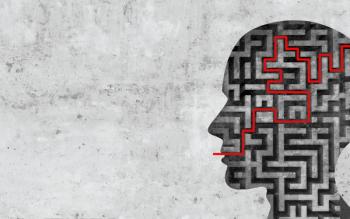
- Psychiatric Times Vol 20 No 10
- Volume 20
- Issue 10
Cognitive Therapy's Faulty Schema
Cognitive Therapy's Faulty Schema
Download this in PDF format.
Get
In the land of psychotherapy for depression, crowned by the research literature, cognitive therapy has long reigned supreme. Is the emperor as fully clothed as everyone seems to think?
Just back from college, a young woman is describing her near-fatal overdose. She is one of those people who ostensibly has everything going for her, yet has been dogged by melancholy for years. Excellent psychiatric treatment at school, including medication, had her feeling "almost well" and succeeding academically by semester's end, but one night, with nothing obvious bothering her, she slowly downed a month's supply of three medications. She doesn't remember any clear intent or intense feeling of despair--just a sort of "absent-minded daze."
Having been found and having survived her coma on an intensive care unit ventilator, she again feels back to normal and is as puzzled as I am over what happened (although I can label it a dissociative episode).
This kind of story is as common as it is baffling. To academics who might object that there could be a comorbidity lurking here, I reply that the real world has no exclusion criteria.
If our trainees are ever in a position to treat a case like this in a role more substantial than medication consultant, they will need a workable theory of mind to approach it. At a minimum, any such theory will have to give them some way to think about unconscious motivation. Instead, training programs are feeding our residents good old American common sense and glorifying it into a theory of mind that is completely inadequate to such everyday tragedies and mysteries. Why? Let's listen to Schuyler (2003), guest editor of the May issue of Primary Psychiatry:
Managed care has stressed cost-effectiveness and a bottom-line related bias for brief therapy. Cognitive therapy fit the bill. Psychotherapy researchers have emphasized 'manualized therapies' to promote standardization to facilitate study. Cognitive therapy fit the bill. Psychodynamics takes a long time to master, with often ponderous readings and substantial irrelevance for the trainee. Trading upon its here-and-now focus, its harnessing of the patient's problem-solving skills, its rejection of the unconscious and transference, the cognitive model can be taught to trainees quickly. Cognitive therapy fits the bill.
But cognitive therapy does not fit the bill for the case of my college student. The problem to be solved is not clear and didn't seem to be in the here-and-now when she overdosed; there-and-then elements are likely to be relevant. It may take more than a brief effort to bring them to light, and I won't have the option of rejecting the Unconscious in that effort.
Reject the Unconscious! One might as well try to reject the air. Any psychiatric training worthy of the name will have to include a psychodynamic psychotherapy modality that "takes a long time to master." Some difficult reading may indeed be necessary! Psychiatry is, after all, a medical specialty. You don't see nephrologists deciding to "reject the glomerulus" as a shortcut to learning dialysis.
Call the Unconscious a construct if you will, but this will not help my patient. Like many other deeper realities in science-the continental drift, the evolution of species, the gravitational bending of space--the Unconscious must be inferred from more tangible and observable realities. It can't be seen like a glomerulus can (though brain structures important to its functioning certainly can--see below), and there may be better ways to think about it (e.g., multiple "coconscious modules" of mental functioning). But one thing is certain: my patient and I are stuck with the Unconscious whether it is rejected or not.
This kind of situation leads many an experienced clinician to echo Beiber (2003) in a recent review examining the evidence-based mandate for cognitive therapy:
I remain ambivalent. On the one hand I see results with some patients, but I also see failures with other patients, who react to this form of therapy as a naive view of the world. The idea that depression is based on cognitive interpretation and that this interpretation can be modified can be experienced by the patient as a large empathic failure.
Evidence-based medicine is both a set of statistical techniques and a fashionable movement in internal medicine. An explanation of why its methodology misses some of the most important aspects of psychiatric treatment is beyond my scope here, and I refer the reader to the paper by Williams and Garner (2002). For the purposes of this essay, I am willing to grant that cognitive therapy is helpful for many patients, much of the time. However, the questions of why it works and what it really is need to be answered before we let it replace psychodynamics as psychiatry's workaday theory of mind and therapeutic interaction.
What may be good for a subgroup of patients may nonetheless be bad for psychiatry if we elevate it to the dominant worldview of our profession and our major training modality for psychotherapy. Here are some of the reasons why, which I will discuss:
- Cognitive therapy does not reflect current knowledge of how the brain works;
- Cognitive therapy is not rational;
- Cognitive therapy does not really reject transference;
- Cognitive therapy unquestioningly supports the social status quo;
- Cognitive therapy gives patients no means of responding to unsolvable problems: to the inherently tragic nature of life.
It is well-established that activity in the amygdala and other parts of the limbic system, which assign emotional significance to incoming sensory stimuli, is initially independent of cortical input (e.g., the influence of negative beliefs). Direct pathways through the thalamus light up the amygdala in half the time required for signals to reach this structure indirectly via thalamo-cortical pathways.
Thus, affective responses often occur before any integrated cognitive processing does. Previous overwhelming experiences are stored haphazardly by a stress-impaired hippocampus as unintegrated sensory-affective fragments. These can operate unconsciously to further distort the cognitive functioning that does eventually occur. As Shean (2001) stated:
A depressed patient may be responding at an affective level to inner somatic and outer stimuli that have not been contextualized or organized but represent unrecognized elements of previous experiences. These affective reactions can occur independently of any form of cortical processing.
I believe this is exactly what was happening when my young patient overdosed.
In sum, while beliefs can influence emotions, neuroscience says that the bulk of the influence is in the other direction. Psychodynamics has said this all along.
Turning from the demands of neuroscience to those of ordinary logic, we find cognitive therapy equally wanting. It simply labels as irrational any inference patients may make that does not conform to the most optimistic possibility! Ignoring the patient's history and arrogating to itself the power to judge what is or is not a realistic conclusion to draw from that history, cognitive therapy, in the words of Fancher (1995), "lends the authority of the therapy industry to positive illusions."
Of course, any good general psychotherapist, regardless of their theoretical orientation, will try to highlight neglected possibilities, to challenge black-and-white thinking, to encourage "shifts of set" when appropriate and indicated. But there is something obscene about the image of a young, inexperienced trainee reducing the problems of--for example--a 60-year-old minority woman who has lived a life of abandonment, abuse and economic deprivation to three columns on a blackboard and presuming to correct the "errors" in her thinking. Fortunately, many trainees have the presence of mind and the compassion to wake up to what they are being told to do. For, as one patient of mine memorably said of her brush with cognitive therapy: "People have been telling me how to think all my life!"
With its error-correcting stance, it is apparent that cognitive therapy is not rejecting transference. Instead, it is trying to hold transference constant in a benign authoritarian form and hoping to forget about it. Time and again I see puzzled therapists wondering why things aren't going according to plan when patients sabotage their authority!
The very best critique of cognitive therapy (and I have already drawn upon some good ones) was written a century ago by William James in The Varieties of Religious Experience (1902). James, the father of American psychology and a sufferer from severe recurrent (and occasionally, psychotic) depression, took on modern cognitive therapy's direct ancestor, the mindcure movement of the 19th century (which also begat Christian Science). He conceded:
Diverting one's attention from evil is splendid as long as it will work. It will work with many persons, and within the sphere of its successful operation there is nothing to be said against it. But it breaks down impotently as soon as melancholy comes ... The only relief that healthy-mindedness can give is by saying: 'Stuff and nonsense! Cheer up old fellow, you'll be alright erelong, if you will only drop your morbidness!'
Mincing no words, James called this "religion of healthy-mindedness" "unspeakably blind and shallow."
For the common-sense remedies of cognitive therapy to work, two unexamined and truly incorrect core schemata must be maintained. First is that the social status quo is essentially fair and just, with fulfilling possibilities available to all who keep an open mind. As Fancher (1995) puts it, "People can fit, if they just think straight."
Indeed, it would be both comforting and therapeutic to believe that our society gives everyone a fair shake. Social alienation has a proven negative effect on mental and physical health. The problem is patients who are depressed often have plenty of real-life evidence that society isn't fair or safe. In the name of rationality, cognitive therapy invalidates their experience and the most reasonable inferences to be drawn from it.
The second schema is that bad things are never really final. James (1902) again: "Systematic healthy-mindedness fails to accord sorrow, pain and death any positive and active attention whatever." In other words, the tragic view of life is a cognitive distortion, and those hapless souls who hold it--many of our culture's most creative people-are in error.
Carl Jung once wrote that the most important problems in life are never solved, only outgrown. Pain, loss, alienation from the larger culture, frustrated loves, ambitions that won't go away--such things we do not solve; at best we come to terms with them.
But that process, while often lengthy and painful, yields rewards undreamed of in cognitive therapy's socially adaptive outcomes. For, to finish with James (1902):
The evil facts which it refuses to account for are a genuine portion of reality; and they may after all be the best key to life's significance, and possibly the only openers of our eyes to the deepest levels of truth.
References:
- References 1. Beiber MR (2003), Book review of Treating Chronic and Severe Mental Disorders: Handbook of Empirically Supported Interventions. Am J Psychiatry 160(5):1023-1024.
2. Fancher RT (1995), The middlebrow land of cognitive therapy. In: Cultures of Healing: Correcting the Image of American Mental Health Care. New York: W.H. Freeman, pp195-250.
3. James W (1902), The Varieties of Religious Experience. New York: Mentor Books.
4. Schuyler D (2003), Cognitive therapy: change through problem solving. Primary Psychiatry 10(5):31-32.
5. Shean G (2001), A critical look at the assumptions of cognitive therapy. Psychiatry 64(2):158-164.
6. Williams DD, Garner J (2002), The case against "the evidence": a different perspective on evidence-based medicine. Br J Psychiatry 180:8-12.
Articles in this issue
over 22 years ago
Research Fails to Link Talk Therapy With Heart Attack Survivalover 22 years ago
Risperidone May Lower Risk of Fallsover 22 years ago
Genetic Components of Depression Identifiedover 22 years ago
Expressions of Social Anxiety in Asian-Americansover 22 years ago
Cultural Psychiatric Services: Past, Present and Futureover 22 years ago
Trauma and Violence in Childhood: A U.S. Perspectiveover 22 years ago
Hispanics and Psychiatric Medications: An Overviewover 22 years ago
Are Assessment and Treatment Influenced by Ethnicity and Gender?Newsletter
Receive trusted psychiatric news, expert analysis, and clinical insights — subscribe today to support your practice and your patients.







